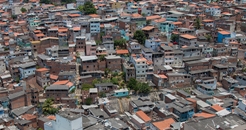 Global economic inequality: what matters most is not who you are, but where you are
Global economic inequality: what matters most is not who you are, but where you are
From an article on Our World In Data
Global income inequality is vast. The huge majority of the world is very poor. The poorer half of the world, almost 4 billion people, live on less than $6.70 a day.
If you live on $30 a day you are part of the richest 15% of the world ($30 a day roughly corresponds to the poverty lines set in high-income countries).
Inequality can be very high within countries, the US – a high-income country with extraordinary large inequality – is a prime example of this. But much of global inequality is inequality between countries. Economic inequality is only one dimension of global inequality but because a high income is so important for good living conditions these other inequalities are as a result of economic inequality. Those who live on higher incomes have advantages in many ways.
Where incomes are higher people live longer, children die less often, mothers die less often, doctors can focus on fewer patients, people have better access to clean drinking water and electricity, they can travel more, have more free time, have better access to education and better learning outcomes, and people are more satisfied with their lives. It is hard to overstate how very large these differences are. Life expectancy in the poorest countries is 30 years shorter than in the richest countries.
Seeing how much our living conditions depend on the productivity of the economy we live in should matter hugely for our own self-understanding and our view of others. In a world of such vast inequalities between countries it is not who a person is that determines whether they are well-off or poor, but where a person is.
Inequality researcher Branko Milanovic found that the country where a person lives explains two-thirds of the variation of income differences between all people in the world. Where a person lives is the most important factor of their income.
For a variety of reasons – from family ties to the political restrictions that impede migration – very few people move between countries. The vast majority of the world population [97%] live in the country they were born in. And so for most people in the world, it is not only the country they live in that determines their income, but it is the country they were born in.
All of this is not to say that a person’s work ethic, talent, and skills do not matter for their income. They do. But it is to say that all these personal factors together matter much less than the factor that is entirely outside of a person’s control: whether they are born into a large, productive economy or not.
Redistribution through the state plays a large role in reducing inequality within countries and could also reduce global inequality. However, the reality is that, no matter in which rich country you pay your taxes, almost none of that goes to the world’s poor people. The redistribution that governments do is not reaching the poorest people: it is domestic not international redistribution.
If you want to reduce global inequality and support poorer people, you do however have this opportunity. You can donate some of your money. You might be able to live on a little less and this money could make a big difference to a poorer person. The most direct way is to send some of your money directly to very poor people, a non-profit organization such as GiveDirectly makes this possible. Also see GiveWell who research the effectiveness of charities.
Some suggest we can end poverty without additional growth by simply reducing global inequality. This is not the case. Reducing global inequality can achieve a lot, but it is important to be clear that redistribution alone would still mean that billions of people would live in very poor material conditions. The world is far too poor to end poverty without large growth. We can see this when we look at our global history. Two centuries ago the world was much more equal: Average income, measured with GDP per capita in the chart, was low everywhere and the huge majority of people was extremely poor.
Since then some countries have achieved very large growth – Swedes are for example about 30-times richer than two centuries ago – while other economies hardly grew at all. This unequal development resulted in the extremely large global inequality of today. The reality of today’s global inequality is cruel. Those who are born into an economy that achieved large growth in the last two centuries grow up in much better living conditions than those who happen to be born into a poor economy. Economic growth for billions of people in poverty is what we need to end this injustice.
What we have seen here is one of the most important insights of development economics: people live in poverty not because of who they are, but because of where they are. A person’s knowledge, their skills, and how hard they work all matter for whether they are poor or not – but all these personal factors together matter less than the one factor that is entirely outside of a person’s control: whether they happen to be born into a large, productive economy or not.
What gives people the chance for a good life is when the entire society and economy around them changes for the better. This is what development and economic growth are about: transforming a place so that what was previously only attainable for a few comes into reach for all.
Read the full article and see the data here.
Retweet about this article:
From an article on Our World In Data, 25/05/2022